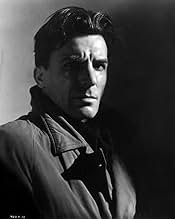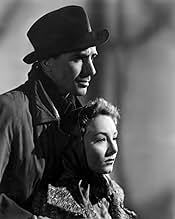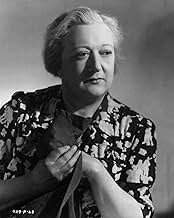Adicionar um enredo no seu idiomaA train disaster is told as four short stories to give character studies of the people involved, how it will affect them, and how they deal with it.A train disaster is told as four short stories to give character studies of the people involved, how it will affect them, and how they deal with it.A train disaster is told as four short stories to give character studies of the people involved, how it will affect them, and how they deal with it.
- Direção
- Roteiristas
- Artistas
Patric Doonan
- Ron Stacey (segment "The Engine Driver")
- (as Patrick Doonan/Patric Doonan)
Avaliações em destaque
Compenium films such as these were very popular in the late forties.Naturally their success rides and falls on the quality of the story.Alas in this case only one of the stories is worth telling.The Valerie Hobson/John Clements story is truly awful.Jack Warners domestic problems seem more like an episode of the Huggetts.The ex German POW story has some promise but becomes repetitive.The Peter Finch/Mary Morris story is quite good but is undermined by the somewhat ridiculous proposition that a murderer would cart the dead body of his wife around in a theatrical basket.The fact that there is a good cast,and a strong band of writers and directors make it all the more disappointing.The most interesting aspect of the film is the considerable location work,which includes a view of the late lamented Euston arch.
This is a not very widely known portmanteau film from 1949, in which four disparate stories are told, each culminating in the protagonists boarding a train to Liverpool, their stories becoming ever more enmeshed, only this train is headed for disaster.
I largely agree with Robert Temple's review (although there are spoilers and it is John Clements who plays the composer, not Gregson).
In contrast to many of the other reviews I found something rather good in all four stories, be it drama, witty dialogue, or humour. I thought it was all rather well done actually. For me, the standout performance was probably that of Peter Finch, who looked gaunt and utterly riven throughout.
In addition to the intriguing structure of the film -which has surely acted as an example to later directors- this film has interest today because it shows many street scenes in London and various scenes shot on the railways; who would have thought the age of steam would be over about fifteen years after this?
Anyway whilst some of the facets of this film will be lost on some folk, overall I thought it a pretty good effort, deserving to be better known and more widely appreciated than it is. Eight out of ten from me.
I largely agree with Robert Temple's review (although there are spoilers and it is John Clements who plays the composer, not Gregson).
In contrast to many of the other reviews I found something rather good in all four stories, be it drama, witty dialogue, or humour. I thought it was all rather well done actually. For me, the standout performance was probably that of Peter Finch, who looked gaunt and utterly riven throughout.
In addition to the intriguing structure of the film -which has surely acted as an example to later directors- this film has interest today because it shows many street scenes in London and various scenes shot on the railways; who would have thought the age of steam would be over about fifteen years after this?
Anyway whilst some of the facets of this film will be lost on some folk, overall I thought it a pretty good effort, deserving to be better known and more widely appreciated than it is. Eight out of ten from me.
'Train of Events' was a critical and commercial failure in its time but if you like these British films as much as I do I think you'll find plenty to enjoy here.
'Compendium' films were popular in the late Forties, several were made from the short stories of Somerset Maugham and then there was the greatest of them all 'Dead of Night'. 'Train of Events ', hardly in that class, contains four stories which all culminate on a train which we saw crashing in the opening scenes. So, like 'Friday the Thirteenth' ( a great portmanteau movie made in 1933) the climax is a matter of virtue rewarded and villainy punished as not everyone survives.
Interestingly television is quite strongly featured for the time (1949), a wind-up gramophone looks much more appropriate!
Valerie Hobson is first actor credited though her role is no larger than several others, she plays the forgiving wife of a philandering husband. In real life Hobson was married to British cabinet minister John Profumo whose relationship with Christine Keeler brought down a government in the sixties. Once again Life Imitates Art. In another story Peter Finch murders his faithless wife. He spouts chunks of Shakespeare, looked gaunt and middle-aged to me.
The model-work at the climax is satisfyingly convincing, I recommend 'Train of Events'
'Compendium' films were popular in the late Forties, several were made from the short stories of Somerset Maugham and then there was the greatest of them all 'Dead of Night'. 'Train of Events ', hardly in that class, contains four stories which all culminate on a train which we saw crashing in the opening scenes. So, like 'Friday the Thirteenth' ( a great portmanteau movie made in 1933) the climax is a matter of virtue rewarded and villainy punished as not everyone survives.
Interestingly television is quite strongly featured for the time (1949), a wind-up gramophone looks much more appropriate!
Valerie Hobson is first actor credited though her role is no larger than several others, she plays the forgiving wife of a philandering husband. In real life Hobson was married to British cabinet minister John Profumo whose relationship with Christine Keeler brought down a government in the sixties. Once again Life Imitates Art. In another story Peter Finch murders his faithless wife. He spouts chunks of Shakespeare, looked gaunt and middle-aged to me.
The model-work at the climax is satisfyingly convincing, I recommend 'Train of Events'
The film starts with a train crash and then spends its bulk describing 4 separate situations that leads to various characters being on board the doomed train. We then return to the crash and see its aftermath.
Sounds better than it is. The film starts impressively with the force and speed of the train filmed very dramatically. This is far and away the best part of the film and provides a very powerful opening. As we meet the characters, the film gets boring and sadly, that awful unfunny British humour rears its ugly head in a couple of scenes. Trying to endear the audience to old guys by getting them to imitate a chicken or a goldfish just isn't funny to me.
Aside from the naff comedy, the cast aren't very good. This is because either the characters are weak, such as Joan Dowling (Ella), to the point where we don't care about her fate, or else they are just difficult to like. A case in point is pretty much everyone else apart from Valerie Hobson (Stella).
Pianist Irina Baronova (Irina) and composer John Clements (Raymond) are painfully embarrassing and it's all a bit of an anti-climax when so many of this dull ensemble actually survive what looks like a crash that should have resulted in many more fatalities. Oh well, better luck next time! The film scores for the excellent beginning and a confrontational scene between husband and wife Peter Finch (Philip) and Mary Morris (Louise). If the film had concentrated on developing this story in a dramatic fashion, I would be talking about a much better film. But even this little vignette is ruined by absurdity as demonstrated by what Peter Finch decides to pack in his luggage. In his LUGGAGE! To take with him! Dumb film.
Sounds better than it is. The film starts impressively with the force and speed of the train filmed very dramatically. This is far and away the best part of the film and provides a very powerful opening. As we meet the characters, the film gets boring and sadly, that awful unfunny British humour rears its ugly head in a couple of scenes. Trying to endear the audience to old guys by getting them to imitate a chicken or a goldfish just isn't funny to me.
Aside from the naff comedy, the cast aren't very good. This is because either the characters are weak, such as Joan Dowling (Ella), to the point where we don't care about her fate, or else they are just difficult to like. A case in point is pretty much everyone else apart from Valerie Hobson (Stella).
Pianist Irina Baronova (Irina) and composer John Clements (Raymond) are painfully embarrassing and it's all a bit of an anti-climax when so many of this dull ensemble actually survive what looks like a crash that should have resulted in many more fatalities. Oh well, better luck next time! The film scores for the excellent beginning and a confrontational scene between husband and wife Peter Finch (Philip) and Mary Morris (Louise). If the film had concentrated on developing this story in a dramatic fashion, I would be talking about a much better film. But even this little vignette is ruined by absurdity as demonstrated by what Peter Finch decides to pack in his luggage. In his LUGGAGE! To take with him! Dumb film.
This curiously little known film commands your attention from the very beginning - with what must be one of the best opening sequences ever committed to film - a startling ultra-serious train wreck looming forward - but we don't see the outcome till the finish of the story. The story, or actually stories, take the form of introducing us to four of the doomed train's passengers from 3 days before the incident. Four British directors each take a turn at 'telling' each passengers tale - up to the aftermath. For some, this technique might give the movie an episodic feel, as each presents in their own style but most won't even be aware of this. Generally, it's an interesting movie even if certain elements might now look somewhat dated but this of course will be personal to each viewer.
Two major award-winning Cinematographers Paul Beeson, and Gordon Dines, share the job of capturing the events as they unfold - all on nice b/w film stock. The film has been given a quite lavish re-mastering and the Ealing Studios DVD offers clean images and good sound. As might be expected from Ealing, there are scatterings of humor throughout the dramatic journey. Train enthusiasts will be enthralled at seeing the range of engines and rolling stock of the day being paraded - including LMS Royal Scott Class No. 46126. For any who enjoy British 40-50s movies, this could well suit you and Aussie Peter Finch appears in a major early role.
Two major award-winning Cinematographers Paul Beeson, and Gordon Dines, share the job of capturing the events as they unfold - all on nice b/w film stock. The film has been given a quite lavish re-mastering and the Ealing Studios DVD offers clean images and good sound. As might be expected from Ealing, there are scatterings of humor throughout the dramatic journey. Train enthusiasts will be enthralled at seeing the range of engines and rolling stock of the day being paraded - including LMS Royal Scott Class No. 46126. For any who enjoy British 40-50s movies, this could well suit you and Aussie Peter Finch appears in a major early role.
Você sabia?
- CuriosidadesPeter Finch and Laurence Payne received "and introducing" credits.
- Erros de gravaçãoWithin the first minute and a half of the film the locomotive pulling the Euston to Liverpool express varies several times in cut shots from the largest 4-6-2 "Duchess" express locomotive to a variety of different, smaller 4-6-0 locomotives, variously with or without smoke deflectors, with single or double chimneys, with tapered or parallel boilers and with different numbers and tender insignias ("British Railways" or "LMS"). At one point a "Duchess" is seen again. Locomotive classes seen pulling the same train without it stopping thus include "Duchess", "Jubilee", "Patriot" and "Royal Scot".
- Citações
Doris Hardcastle (segment "The Engine Driver"): Oh, it's you...
Ron Stacey (segment "The Engine Driver"): Well, don't overwhelm me ducks. I dunno as my poor old ticker'll stand it.
- ConexõesFeatured in Remembering John Gregson (2019)
- Trilhas sonorasThese Foolish Things (Remind Me Of You)
(uncredited)
Music by Jack Strachey and Harry Link
Lyrics by Eric Maschwitz
Sung by Leslie Hutchinson
Played in Philip's apartment
Principais escolhas
Faça login para avaliar e ver a lista de recomendações personalizadas
Detalhes
- Tempo de duração1 hora 28 minutos
- Cor
- Proporção
- 1.37 : 1
Contribua para esta página
Sugerir uma alteração ou adicionar conteúdo ausente

Principal brecha
By what name was Train of Events (1949) officially released in Canada in English?
Responda
































